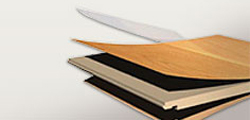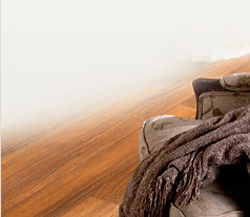
The decision to install a particular flooring type depends on various factors such as its aesthetics, durability, price and effect of moisture. It is the impact of moisture on different flooring types that restricts the use of certain flooring options in high moisture areas such as the kitchen and the shower.
Hardwood flooring is highly sensitive to the surrounding moisture content since it is fibrous and absorbs and releases moisture. All wooden floors expand and contract according to temperature and humidity changes. Hardwood contracts when the relative humidity is less than the moisture content of the wood. On the other hand, hardwood expands when its moisture content is less than the relative humidity. Fluctuating moisture levels can significantly affect the shape of your hardwood flooring.
Another flooring material that is affected by the moisture levels is bamboo. Since bamboo is actually a type of grass, and is fibrous as well, it also absorbs and releases moisture. Excess moisture in the air will cause your bamboo flooring to swell and bend. In contrast, less moisture in the air will dry the bamboo flooring and cause cracks in it.
Although laminate flooring is considered to be the most durable out of all the flooring options it is still susceptible to moisture. During the manufacturing process, a durable coating is applied on laminate flooring to make it resistant to moisture. Even after this coating excess exposure to moisture can cause laminate flooring to expand significantly.
Cork is another flooring material that is impervious to water seepage. Cork contains a natural material that makes it highly durable and ideal for use in areas such as the kitchen as well. However, since cork is a natural material it is affected by humidity changes. Although cork is not affected by moisture in the same way as hardwood is, yet it should be properly cared for to prevent damage.
Even though different flooring materials respond differently to fluctuations in moisture levels, it is important to limit the exposure of moisture to your flooring. One of the most effective ways of ensuring the relative air humidity does not affect your flooring is known as acclimation.
Acclimation is a pre installation process to ensure that the flooring adjusts to the humidity level in a particular room. Generally, this process consists of placing the flooring material in the room where it is to be installed, for a period of 2-3 days. During this time, the temperature as well as the humidity levels in the room should be controlled for maximum effectiveness.
Controlling the moisture levels around your flooring is important for a number of reasons. One of the main reasons is that excess moisture, or lack of moisture can cause the flooring to shrink or expand. This in turn would affect the integrity of the flooring. Another reason is that unless proper maintenance of the flooring is done the warranty on it would not be valid. It is for these reasons that you should ensure that your flooring is not exposed to moisture, or excess fluctuations in humidity levels.
Copyright © 2010 FlooringSupplyShop.com


Nice to be visiting your blog again, it has been months for me. Well this article that i’ve been waited for so long.
I do accept as true with all the concepts you have introduced in your post. They’re really convincing and will certainly work. Still, the posts are very short for newbies. May you please prolong them a bit from subsequent time? Thank you for the post.